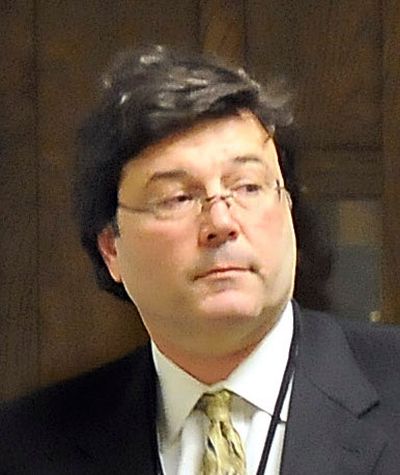Attorney seeks no jail for Thompson

The attorney for Karl F. Thompson Jr. asked a federal judge today to give the decorated former Spokane Police Officer a “just” sentence that includes no imprisonment.
A week after federal prosecutors asked U.S. District Court Judge Fred Van Sickle to sentence Thompson to 10 years, defense attorney Carl Oreskovich filed a 22-page brief detailing why he thinks Thompson should get leniency.
“Defendant Thompson is a man of truly outstanding character whose convictions are an aberration when compared to a lifetime of earnest dedication to law enforcement,” Oreskovich wrote. “He has suffered the loss of his lifetime career and constant public humiliation.
“Therefore, Defendant Thompson respectfully asks this Court to fairly impose a just and reasonable sentence … including the alternative of no imprisonment.”
Van Sickle has scheduled Thompson’s sentencing for Nov. 15, which is more than a year after a jury in Yakima convicted him of using excessive force and lying to investigators about his 2006 confrontation with Otto Zehm, a mentally ill and disabled janitor mistakenly implicated in a possible theft. Zehm died two days after being beaten, shocked with Tasers and hogtied.
Thompson faces a standard range of 27 to 33 months in prison based on the pre-sentence evaluation.
However, Assistant U.S. Attorney Timothy Durkin filed documents last week detailing several concerns prosecutors have with the presentence report that came up with that sentencing range.
Durkin said in court records that the probation officer who completed the presentence report only talked to witnesses provided by defense, “all of whom provided information favorable to” Thompson, Durkin wrote.
Oreskovich barely mentioned the pre-sentence report, other than to argue that Thompson should be given credit for taking responsibility for his crimes. Mostly, Oreskovich focused on Thompson’s career, which included earning medals while serving in the U.S. Army in Vietnam and 28 distinguished years in law enforcement prior to the confrontation with Zehm six years ago.
“The vast weight of the evidence suggested that Defendant Thompson, at all times, was acting to perform a legitimate law enforcement function, that is, to detain Mr. Zehm who was suspected of committing a crime and resisting detention,” Oreskovich wrote.
Oreskovich said Zehm did not follow Thompson’s verbal commands and continued to resist after Thompson began striking him with a baton inside a North Spokane convenience store.
“These facts are not offered to shift blame to Mr. Zehm,” Oreskovich wrote. “Rather, when analyzing the conduct of the Defendant, this Court should consider these factors in determining mitigation.”
Oreskovich said his client has suffered “daily punishment” because of intense media coverage of the incident, criminal investigation, trial and legal argument seeking to undo the conviction.
“More so than any other criminal defendant in the area over the last decade, Defendant Thompson has often been villanized … in news reports and columns,” Oreskovich wrote. “Additionally, Defendant Thompson has been made the poster-child for all things allegedly wrong with the Spokane City government and is often referred to in reference to a corrupt police department, City Attorney’s Office and/or Mayor’s Office.
“The great irony of this case is that Defendant Thompson is a person many of his peers looked to as the pillar for leadership and honor in law enforcement.”
Oreskovich informed Van Sickle that he can impose probation because Thompson was not found to have caused great bodily harm on Zehm, who suffered more than a dozen baton strikes and multiple shocks with a Taser.
“A man who had dedicated his entire life, and risked his life for, the protection of the community now is ostracized, made the scapegoat, mocked, and at times, publically falsely accused,” Oreskovich wrote.
As for the lying to investigators conviction, Oreskovich said Thompson was penalized for trying to rely on his memory instead of taking up a Spokane Police detective’s offer to review the video tape before giving a statement.
Thompson’s statement was “based solely upon his memory. In retrospect, Defendant Thompson’s decision was ill-fated because ultimately, he was convicted after repeated viewing of the same video footage by the jury,” Oreskovich wrote. “This effectively allowed the jury to judge Defendant Thompson’s actions with more information than was available to him.”